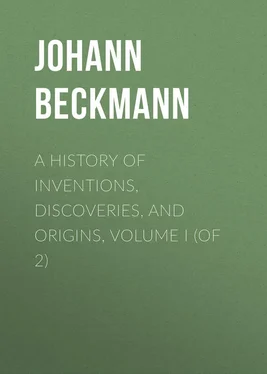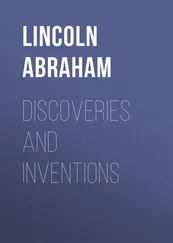Johann Beckmann - A History of Inventions, Discoveries, and Origins, Volume I (of 2)
Здесь есть возможность читать онлайн «Johann Beckmann - A History of Inventions, Discoveries, and Origins, Volume I (of 2)» — ознакомительный отрывок электронной книги совершенно бесплатно, а после прочтения отрывка купить полную версию. В некоторых случаях можно слушать аудио, скачать через торрент в формате fb2 и присутствует краткое содержание. Жанр: foreign_antique, foreign_prose, на английском языке. Описание произведения, (предисловие) а так же отзывы посетителей доступны на портале библиотеки ЛибКат.
- Название:A History of Inventions, Discoveries, and Origins, Volume I (of 2)
- Автор:
- Жанр:
- Год:неизвестен
- ISBN:нет данных
- Рейтинг книги:4 / 5. Голосов: 1
-
Избранное:Добавить в избранное
- Отзывы:
-
Ваша оценка:
- 80
- 1
- 2
- 3
- 4
- 5
A History of Inventions, Discoveries, and Origins, Volume I (of 2): краткое содержание, описание и аннотация
Предлагаем к чтению аннотацию, описание, краткое содержание или предисловие (зависит от того, что написал сам автор книги «A History of Inventions, Discoveries, and Origins, Volume I (of 2)»). Если вы не нашли необходимую информацию о книге — напишите в комментариях, мы постараемся отыскать её.
A History of Inventions, Discoveries, and Origins, Volume I (of 2) — читать онлайн ознакомительный отрывок
Ниже представлен текст книги, разбитый по страницам. Система сохранения места последней прочитанной страницы, позволяет с удобством читать онлайн бесплатно книгу «A History of Inventions, Discoveries, and Origins, Volume I (of 2)», без необходимости каждый раз заново искать на чём Вы остановились. Поставьте закладку, и сможете в любой момент перейти на страницу, на которой закончили чтение.
Интервал:
Закладка:
“O colleagues, if we indulge in deep sorrow at this new diminution of our fraternity by the death of one of its seniors, it must be forgiven, as consonant to our duty and piety, as well as to the affections of human nature. Indeed, when his death was announced, and when I afterwards beheld the mournful pomp of his funeral, I was afflicted with the utmost grief. Nor can this be wondered at, when it is borne in mind that he was nearly of my own age, and next to me the eldest of our Society; the habit, too, of friendly intercourse enjoyed for many years, has great influence in riveting the affections of the mind.
“There is a narrative in Herodotus, concerning Psammenitus king of Egypt, who was conquered by Cambyses king of Persia. The city of Memphis being taken by storm, he had fallen into the hands of Cambyses; who, enraged at the vigorous defence he had encountered, commanded the royal family to be brought forth and put to death. In the first place, his daughter was paraded before him, with many maidens of noble birth, clothed as slaves; and though the other parents uttered piteous lamentations, yet Psammenitus kept his eyes fixed on the ground: in like manner, when his sons, together with two thousand of the principal youths, their necks bound with ropes, with bridles in their mouths, were ignominiously led to death, the king did not even utter a groan; but on seeing an aged man approach, one of his old friends, who had formerly partaken of the royal table, walking in the dress of a mendicant, and imploring mercy through the different ranks of the army, then indeed the king could restrain his emotions no longer, but broke forth into the most bitter wailings. The cause of this strange grief it would be foreign to our present purpose to discuss; I only wish to draw this conclusion – that the death of an old friend and companion was alone able to subdue his mind, even after it had supported him against the severest calamities. For the force of habit and friendly intercourse is most powerful: we bring to recollection many things which prey upon our feelings; they rush upon our memory with one impetus, and swell the rising grief; we dwell on early struggles, on proofs of mental power, and instances of benevolence, which formerly we had passed unheeded.
“What is known favourably of the character of him who is taken away from us, it is our pleasing duty to bring before you; what is otherwise, if anything exist, it is not our province to remember.
“The studies of Beckmann were applied to other branches of learning, quite distinct from those in which I am occupied: but it was this very circumstance which cemented our acquaintance. His conversations on scientific subjects could not but prove profitable; especially as he blended them with a feeling for ancient literature. I was accustomed to consult him concerning subjects of nature and art, which I did not sufficiently understand; and he sometimes referred to me respecting philological matters, of which he wished to gain further information. But the varied talents of this illustrious man were wonderful: an unceasing desire to search into the origin of arts and sciences, and the history and success of inventors, was united with an insatiable thirst for general knowledge and classical learning. He was incessantly in our public library, eagerly investigating and comparing rare books in pursuit of his object; seizing their hidden treasures, and then contributing his booty to the mental improvement of the million.”
The remainder of this elegant oration concerns the details of his career, which are already embodied in the preceding sketch.
H. G. B.ITALIAN BOOK-KEEPING
Those who are acquainted with the Italian method of book-keeping must allow that it is an ingenious invention, of great utility to men in business, and that it has contributed to extend commerce and to facilitate its operations. It requires no less attention, care, and accuracy, than many works which are styled learned: but it is undoubtedly true, that most mercantile people, without knowing the foundation of the rules on which they proceed, conduct their books in as mechanical a manner as many of the literati do their writings.
The name, Italian book-keeping, Doppia scrittura , with several words employed in this branch of science and still retained in all languages, make it probable that it was invented by the Italians; and that other nations borrowed it, as well as various short methods of reckoning, from their mercantile houses, at the time when all the East-India trade passed through Italy.
De la Porte says 8, “About the year 1495, brother Luke, an Italian, published a treatise of it in his own language. He is the oldest author I have seen upon the subject.” Anderson, in his Historical and Chronological Deduction of the Origin of Commerce 9, gives the following account: “In all probability, this art of double-entry accounts had its rise, or at least its revival, amongst the mercantile cities of Italy: possibly it might be first known at Venice, about the time that numeral algebra was taught there; from the principles of which science double-entry, or what we call merchants’ accounts, seems to have been deduced. It is said that Lucas de Burgo, a friar, was the first European author who published his algebraic work at Venice, anno 1494.”
This author, who was one of the greatest mathematicians of the fifteenth century, and who is supposed to be the first person who acquired a knowledge of algebra from the writings of the Arabians, was called Lucas Paciolus, e Burgo S. Sepulchri. He was a Franciscan, and so surnamed from a town in the duchy of Urbino, on the Florentine confines, called Burgo S. Sepulchro 10.
Anderson tells us 11, that he had in his possession the oldest book published in England in which any account is given of the method of book-keeping by double-entry. It was printed at London, in 1569, in folio. The author, whose name is James Peele, says, in his preface, that he had instructed many mercantile people in this art, which had been long practised in other countries, though in England it was then undoubtedly new. One may readily believe that Mr. Anderson was not ignorant of the difference between the method of book-keeping by single and that by double-entry; but he produces nothing to induce us to believe that Peele taught the latter and not the former; for what he says of debit and credit is of no importance, as it may be applied also to the method by single-entry.
Of this Peele no mention is made in Ames’s Typographical Antiquities; but in that work (p. 410) there is an account of a still older treatise of book-keeping, entitled A briefe instruction and manner how to keepe bookes of accompts, after the order of debitor and creditor, and as well for proper accompts, partible, &c. by three bookes, named the memoriall, journall, and leager. Newly augmented and set forth by John Mellis schole maister. London 1588, 12mo. Mellis, in his preface, says that he is only the re-publisher of this treatise, which was before published at London in 1543 by a schoolmaster named Hugh Oldcastle. From the above title, and particularly from the three account books mentioned in it, I am inclined to believe that this work contained the true principles of book-keeping by double-entry.
The oldest German work on book-keeping by double-entry with which I am at present acquainted, is one written by John Gotlieb, and printed at Nuremberg, by Frederick Peypus, in 1531 12. The author in his preface calls himself a citizen of Nuremberg, and says that he means to give to the public a clear and intelligible method of book-keeping, such as was never before printed. It appears, therefore, that he considered his book as the first of the kind ever published in Germany.
It is worthy of remark, that even at the end of the sixteenth century, the Italian method of book-keeping began to be applied to finances and public accounts. In the works of the celebrated Simon Stevin, published at Leyden in Dutch, and the same year in Latin, we find a system of book-keeping, as applied to finances, drawn up it appears for the use of Maurice prince of Orange. To this treatise is prefixed, in Dutch and Latin, a dedication to the duke of Sully, in which the author says, that his reason for dedicating the work to Sully was because the French had paid the greatest attention to improve the method of keeping public accounts. The work begins with a conversation, which took place between Stevin and prince Maurice, respecting the application of book-keeping to public accounts, and in which he explains to the prince the principles of mercantile book-keeping. This conversation commences with explaining the nature of debit and credit, and the principal accounts. Then follow a short journal and ledger, in which occur only the most common transactions; and the whole concludes with an account of the other books necessary for regular book-keeping, and of the manner of balancing. Stevin expressly says, that prince Maurice, in the year 1604, caused the treasury accounts to be made out after the Italian method, by an experienced book-keeper, with the best success; but how long this regulation continued I have not been able to learn. Stevin supposes, in this system, three ministers, and three different accounts: a quæstor , who receives the revenues of the domains; an acceptor , who receives all the other revenues of the prince; and a thesaurarius (treasurer), who has the care of the expenditure. All inferior offices for receiving or disbursing are to send from their books monthly extracts, which are to be doubly-entered in a principal ledger; so that it may be seen at all times how much remains in the hands of each receiver, and how much each has to collect from the debtors. One cannot help admiring the ingenuity of the Latin translator 13, who has found out, or at least invented, words to express so many new terms unknown to the ancient Romans. The learned reader may, perhaps, not be displeased with the following specimen. Book-keeping is called apologistica or apologismus ; a book-keeper apologista ; the ledger codex accepti expensique ; the cash-book arcarii liber ; the expense-book impensarum liber ; the waste-book liber deletitius ; accounts are called nomina ; stock account sors ; profit and loss account lucri damnique ratiocinium , contentio or sortium comparatio ; the final balance epilogismus ; the chamber of accounts, or counting-house, logisterium , &c.
Читать дальшеИнтервал:
Закладка:
Похожие книги на «A History of Inventions, Discoveries, and Origins, Volume I (of 2)»
Представляем Вашему вниманию похожие книги на «A History of Inventions, Discoveries, and Origins, Volume I (of 2)» списком для выбора. Мы отобрали схожую по названию и смыслу литературу в надежде предоставить читателям больше вариантов отыскать новые, интересные, ещё непрочитанные произведения.
Обсуждение, отзывы о книге «A History of Inventions, Discoveries, and Origins, Volume I (of 2)» и просто собственные мнения читателей. Оставьте ваши комментарии, напишите, что Вы думаете о произведении, его смысле или главных героях. Укажите что конкретно понравилось, а что нет, и почему Вы так считаете.












